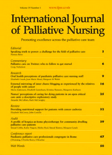
International Journal of Palliative Nursing
Scope & Guideline
Exploring the Frontiers of Palliative Care Research
Introduction
Aims and Scopes
- Patient-Centered Care:
The journal emphasizes the importance of patient-centered approaches in palliative care, focusing on the needs, preferences, and experiences of patients and their families. - Interdisciplinary Collaboration:
Research published in the journal often highlights the role of various healthcare professionals in providing comprehensive palliative care, promoting teamwork and collaboration among nurses, physicians, and allied health professionals. - Cultural Competence:
The journal addresses the significance of cultural considerations in palliative care, aiming to improve care delivery for diverse populations and understand the unique needs of different cultural groups. - Innovative Care Models:
The journal explores new and innovative models of palliative care delivery, including community-based care, telehealth, and integrated care approaches, to enhance accessibility and effectiveness. - Education and Training:
A consistent focus on education and training initiatives for healthcare professionals is evident, with research aimed at improving palliative care competencies and knowledge among nursing students and practicing nurses. - Research Methodologies:
The journal publishes a variety of research methodologies, including qualitative studies, quantitative analyses, and systematic reviews, contributing to a robust evidence base for palliative nursing.
Trending and Emerging
- Impact of COVID-19 on Palliative Care:
Research examining the effects of the COVID-19 pandemic on palliative care practices and patient outcomes has surged, highlighting the need for adaptive strategies in crisis situations. - Use of Technology in Palliative Care:
There is a growing interest in the integration of technology, such as telehealth and mobile applications, to enhance patient care and improve access to palliative services. - Mental Health and Emotional Well-Being:
An increased focus on the mental health and emotional support needs of patients and caregivers within palliative care settings indicates a holistic approach to care. - Cultural Competence and Diversity:
Emerging themes around cultural competence suggest a heightened awareness of the need to tailor palliative care practices to diverse populations and their unique values and beliefs. - Family Caregiver Support:
Research exploring the experiences and needs of family caregivers is on the rise, reflecting a recognition of their critical role in the palliative care process. - Holistic and Integrative Approaches:
There is a notable trend towards holistic care models that incorporate various therapeutic modalities alongside traditional medical treatments, emphasizing overall well-being.
Declining or Waning
- Traditional Pain Management Techniques:
There appears to be a waning focus on traditional pain management strategies, such as pharmacological interventions, as newer approaches like integrative and holistic methods gain traction. - General End-of-Life Care:
Broader discussions around end-of-life care seem to be less frequent, with more emphasis now placed on specific populations or conditions, such as pediatric or geriatric palliative care. - Assisted Dying Discussions:
Research on assisted dying, while still relevant, has seen a decline in frequency, possibly reflecting a shift towards more practical aspects of palliative care rather than ethical debates. - Historical Perspectives on Palliative Care:
There is a noticeable decrease in papers focusing on historical perspectives or the evolution of palliative care practices, as the journal shifts to more contemporary issues and challenges. - Disease-Specific Studies:
While disease-specific studies remain important, there is a noticeable decline in research focusing solely on individual diseases, with a broader, more integrated approach to palliative care becoming more prevalent.
Similar Journals

Nursing-Research and Reviews
Fostering inclusive dialogue in the nursing community.Nursing-Research and Reviews is a prominent open-access journal published by DOVE MEDICAL PRESS LTD, dedicated to the dynamic field of nursing research. Since its inception in 2011, this journal has served as a vital platform for disseminating peer-reviewed articles, review papers, and original research that contribute to evidence-based nursing practice and education. With an ISSN of 2230-522X, it provides valuable insights into the latest developments and trends in nursing, aiming to bridge the gap between academia and clinical practice. The journal's commitment to open access ensures that its content is readily available to researchers, practitioners, and students worldwide, promoting a broader dissemination of knowledge. As part of a reputable publisher recognized for its focus on advancing medical and scientific understanding, Nursing-Research and Reviews plays a crucial role in shaping the future of nursing through innovative research and inclusive dialogue.
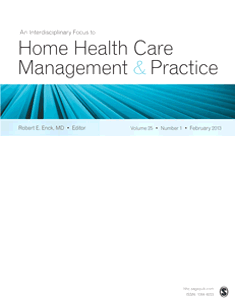
Home Health Care Management and Practice
Elevating Standards in Community and Home CareHome Health Care Management and Practice, published by SAGE Publications Inc., is an esteemed journal dedicated to advancing the field of home health care management through rigorous research and thought-provoking commentary. Established in 1988, this scholarly publication has become a critical resource for professionals, researchers, and students interested in the dynamics of community care and home health services. With an impact that reflects its commitment to quality, the journal holds an impressive standing, achieving a Q2 ranking in Community and Home Care and a Q3 ranking in both Leadership and Management and Public Health, as of 2023. The journal operates without open access, ensuring that its contributions are housed within an esteemed academic framework. Covering key areas such as nursing, leadership strategies, and occupational health, it serves as an essential platform for disseminating knowledge, fostering collaboration, and influencing best practices in the field. The journal's targeted focus empowers its readers to stay at the forefront of emerging trends and evidence-based practices, making it a vital asset for anyone involved in the evolving landscape of home health care.

Revista de Pesquisa-Cuidado e Fundamental Online
Elevating standards of care through collaborative research.Revista de Pesquisa-Cuidado e Fundamental Online, published by the Universidade Federal do Estado do Rio de Janeiro, is a prominent journal dedicated to advancing knowledge and practice in the field of nursing and healthcare. With its Open Access model since 2009, this journal provides an invaluable platform for researchers, professionals, and students to share innovative findings and insights that address critical issues in patient care and nursing education. Though its specific impact factor is not listed, the journal's commitment to open access fosters greater visibility and accessibility of research, ensuring that vital information reaches a wide audience. The journal aims to enhance the quality of care and to support the ongoing development of nursing as a scientific discipline. Located in Rio de Janeiro, Brazil, the journal also reflects regional health paradigms while contributing to global discourse in healthcare research.
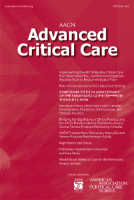
AACN Advanced Critical Care
Empowering healthcare professionals through innovative research.AACN Advanced Critical Care, published by the American Association of Critical-Care Nurses, serves as an essential resource in the field of critical care nursing and emergency medicine. With an ISSN of 1559-7768 and an E-ISSN of 1559-7776, this peer-reviewed journal is committed to advancing the knowledge and practice of critical care through rigorous research and innovative clinical insights. The journal holds a reputable position within its field, achieving a Q2 ranking in Critical Care Nursing and Emergency Medicine, alongside a Q3 ranking in miscellaneous Medicine categories for 2023. With a convergence of scholarly contributions from 2006 to 2024, it strives to explore the latest advancements and challenges in critical care environments, ensuring that its readership of researchers, healthcare professionals, and students are well-informed of emerging trends and best practices. The journal does not offer Open Access, however, its impact and relevance are evident from its Scopus rankings, which place it at a commendable #14 in Critical Care Nursing and #47 in Emergency Medicine. As a crucial platform for knowledge dissemination, AACN Advanced Critical Care plays a vital role in enhancing clinical effectiveness and improving patient outcomes in acutely ill populations.

Journal of Cancer Policy
Bridging the gap between research and cancer management.Journal of Cancer Policy is an esteemed publication devoted to the critical intersection of health policy and oncology. Published by Elsevier Sci Ltd in the United Kingdom, this journal has been a pivotal platform since its inception in 2013, contributing to the field's discourse on cancer management and policy-making strategies. With an impressive Q2 ranking in both the Health Policy and Oncology categories for 2023, it underscores its significance in shaping policy frameworks that address the complexities of cancer care. The journal is listed in Scopus with a respectable rank of #177 in Health Policy and #261 in Oncology, indicating its broad reach and impactful contributions to research and scholarly discussions. While the journal operates under a subscription model, it aims to provide readers with high-quality research that can influence health decisions and policy formation. As a vital resource for researchers, healthcare professionals, and students alike, the Journal of Cancer Policy plays a fundamental role in advancing the understanding of how policies can improve cancer outcomes and healthcare systems.

CANCER NURSING
Pioneering the future of cancer nursing practices.Cancer Nursing, a peer-reviewed journal published by Lippincott Williams & Wilkins, plays a pivotal role in the field of oncology nursing, providing a vital platform for the dissemination of research that enhances patient care and nursing practices related to cancer. With an impressive impact factor and categorized within the Q2 quartile for both oncology and nursing disciplines, this journal ranks among the top resources in its field, sitting at Rank #5 out of 20 in Nursing Oncology. Since its inception in 1978, the journal has continuously evolved to address critical issues in cancer treatment, patient education, and healthcare delivery, making it essential reading for researchers, practitioners, and students alike. Although it does not currently offer open access, the journal's commitment to advancing knowledge in oncology nursing is reflected in its rigorous selection process and the quality of its published research. As we look towards its upcoming issues in 2024, the journal remains a cornerstone for those dedicated to improving cancer care and the overall quality of life for patients and their families.
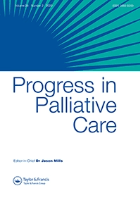
PROGRESS IN PALLIATIVE CARE
Exploring new horizons in palliative care excellence.PROGRESS IN PALLIATIVE CARE, published by ROUTLEDGE JOURNALS, TAYLOR & FRANCIS LTD, is a leading academic journal dedicated to advancing the field of palliative care through high-quality research and innovative practices. With an ISSN of 0969-9260 and an E-ISSN of 1743-291X, this journal serves as a critical resource for healthcare professionals, researchers, and students seeking to enhance their understanding of pain management, symptom relief, and holistic care approaches for patients with life-limiting illnesses. Operating without an open access model, the journal is well-regarded in the academic community, holding a Q3 ranking in Medicine (miscellaneous) and a Q2 ranking in Nursing (miscellaneous) as of 2023. Its Scopus ranking places it at rank #51 out of 139 in General Nursing, reflecting its relevance and quality within the field. Covering the period from 2001 to 2024, it aims to foster interdisciplinary dialogue and share vital research findings to improve palliative care practices, ultimately enhancing patient care and outcomes.
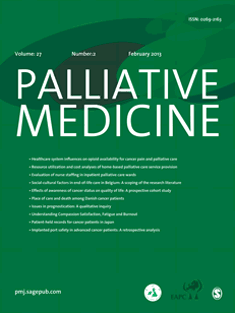
PALLIATIVE MEDICINE
Enhancing Lives Through Palliative ExpertisePalliative Medicine is a premier journal dedicated to advancing the field of palliative care, published by SAGE Publications Ltd. Established in 1987 and continuing through 2024, this esteemed journal focuses on the integration of pain management and comprehensive care for patients with life-limiting illnesses. With its impressive impact factor and a prestigious Q1 ranking in both Anesthesiology and Pain Medicine, as well as in Medicine (miscellaneous), it stands as a critical resource for researchers, healthcare professionals, and students engaged in this vital area of medicine. The journal emphasizes original research, reviews, and clinical studies that contribute to the understanding and practice of palliative care, promoting improved quality of life and support for patients and their families. Although not open access, articles are accessible through institutional subscriptions, ensuring the dissemination of knowledge to a wide audience. Whether you are a seasoned researcher or an emerging professional in the field, Palliative Medicine remains an invaluable platform for scholarly exchange and innovation.
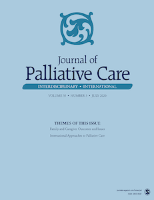
JOURNAL OF PALLIATIVE CARE
Transforming Healthcare with Palliative ExpertiseJOURNAL OF PALLIATIVE CARE is a premier publication in the field dedicated to advancing the understanding and practice of palliative care. Published by SAGE Publications Inc, this journal serves as a vital platform for researchers, healthcare professionals, and students who are at the forefront of improving patient quality of life across various medical contexts. Since its inception, the journal has provided a rich repository of interdisciplinary research and insightful articles, addressing essential topics such as pain management, end-of-life care, and psychological support. With a respectable impact factor and a Q3 quartile ranking in the miscellaneous medicine category, it reflects the growing importance of palliative care in contemporary healthcare. The journal covers pivotal research from 1985 to 2015 and 2017 to 2024, underscoring its commitment to fostering a well-rounded discourse within the medical community. Researchers seeking to contribute to the field will find this journal an invaluable resource for disseminating cutting-edge findings and practical applications.
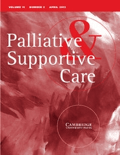
Palliative & Supportive Care
Fostering Interdisciplinary Dialogue for Patient Well-beingPalliative & Supportive Care, published by Cambridge University Press, is a pivotal journal dedicated to advancing research and practice in the fields of palliative care, supportive care, and the psychological aspects of terminal and chronic illness. With a robust ISSN of 1478-9515 and an E-ISSN of 1478-9523, this esteemed journal has established itself as a vital resource for professionals, researchers, and students who are committed to improving the quality of life for patients facing serious health challenges. Featuring peer-reviewed articles that span clinical psychology, medicine, nursing, and psychiatry, it holds a respectable impact factor, ranking Q2 in Clinical Psychology, Medicine, and Nursing as per the 2023 category quartiles. The journal is based in the United Kingdom and has been contributing to the field since its inception in 2003. Although it currently does not offer Open Access, its rigorously curated content underscores its relevance and importance in facilitating interdisciplinary dialogue and innovation in palliative and supportive care. For those seeking to stay at the forefront of research, Palliative & Supportive Care remains an indispensable platform for scholarly communication and discovery.